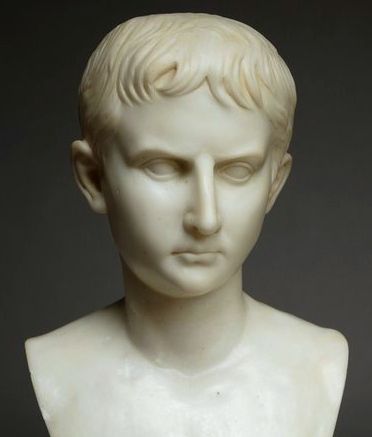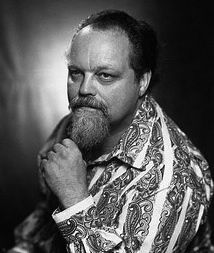
as the buttboy of the King of Bythnia.
February 18, 2007.
In the HBO political soap opera Rome, the course of history is presented in terms of a contest between two ruthless, constantly scheming, vindictive, and very sexual widows, Attia (mother of Octavian (the future Caesar Augustus) and mistress of Marc Antony) and Sevillia (mother of Marcus Brutus and former mistress of Gaius Julius Caesar). The framing of HBO’s Rome turned out to be good preparation for the world premiere of the revised version of Lou Harrison’s opera The Young Caesar.
It shows Julia, widow of Marius, choosing her nephew, the impoverished patrician Gaius Julius Caesar as her horse in the race for dominance of Rome.
It seems that Julia dies while her protégé is off on his mission to get ships in Bithynia (on the northern coast of the peninsula that is now Turkey) and urges him on in dreams after descending into Hades (though in fact, she lived beyond the time covered in the opera). This is one opera that is not “over when the fat lady sings.” [The fat lady was mezzo Wendy Hillhouse.]
The opera opens in 86 BC, with the 16-year-old Caesar [tenor Eleazar Rodriguez] preparing for his coming-of-age ceremony. His aunt Julia tells him he should aspire high and not marry the rich but unattractive Cossitua.
A gigantic puppet head of Cossitua then dances her despair. Caesar marries the match made by his aunt, Cornelia [Sheila Willey]. After Sulla becomes dictator, Caesar refuses to divorce Cornelia, becomes a pirate, is captured by bounty hunters, bribes/tricks them, is pardoned, and goes off to Greece (far from Sulla’s mood swings) as an agent to Thermus.
Caesar is eager to prove himself in battle but is instead dispatched to Bithynia to deliver contracted ships. Dionysus,[Jonathan Smucker], Thermus’ flamboyant slave, urges Caesar to go.
The ambitious youth is confused by the splendor of the “Oriental” court and its queenly king, Nicomedes IV [baritone Eugene Brancoveanu, the vocal star of the show, in a ridiculous Flash Gordon Super-Fruit costume]. Nicomedes is smitten by the young Roman (made up in very white body makeup) and suspicious that the Romans have sent someone they know is just his type in order to get the ships, which his courtiers have a strong interest in delaying.

Caesar sings of his confusions and fears of failing at his first important mission. He is, however, determined to succeed, and if Nicomedes wants a cup-bearer and bedmate, that’s what he’ll get.
There is a sensuous male-male pas-à-deux [danced in a g-string by choreographer Lawrence Pech and Peter Brandenhoff]. Nicomedes gradually covers the young Caesar, so Caesar does not see all (or most?) of the dance.
Nicomedes persuades Caesar to accompany him on a tour of the kingdom—a honeymoon of sorts. Caesar aims to please, and the king falls in love with him, but at the end of the month in which Nicomedes promised that the ships would be completed while they were away, Caesar sails off—Aeneas to Nicomedes’ Dido. Duty trumps love as in the end of Les Troyens, and the final words are “Hail Caesar! and pity Nicomedes who shared in love.”
The viewer is left to wonder whether Caesar felt love or submitted to being a boy-toy to advance his career (he does invite Nicomedes to sail to Rome with him, but Nicomedes knows he would be deposed immediately if he left). For the rest of his life, Caesar was taunted (even by his own troops in Gaul) as being “a husband to every woman and a wife to every man.”
There is a narrator [tenor John Dukyers] in modern dress and IMO too ubiquitous. I think there is too much telling and not enough showing. (Blame librettist Robert Gordon, author of Once and For All and a forthcoming adaptation of House of the Seven Gables).
The first version of the opera was performed by rod-puppets (3-feet-tall) and backstage singers in Pasadena in 1971 (commissioned by the Pasadena Art Museum, before it became the Norton Simon Museum). Apparently, it was even longer than the revised version and entirely lacking in arias. Harrison revised the opera for onstage singers in 1980 and for a 2001 production of the New York City Opera that was to be directed by Mark Morris and conducted by Dennis Russell Davies. It fell through.

Photo by Oscar White
Before Harrison’s death in 2003, he worked with conductor Nicole Paiement (who recorded Harrison’s first opera, Rapunzel, and other music by him) on further revisions.
With a gamelan-substitute xylophone (part of a small orchestra that also includes a harp and a percussive piano part), the music is somewhat repetitious. The tenor/baritone differentiation of the parts of Caesar and Nicomedes is also not great, and the narrator seems to spend most of his time in tenor/baritone overlap. The arias are underdeveloped, and it seems that sung dialogue and arias occupy fewer of the 100 minutes of running time than recitative and dance music.
The staging (excluding the wigs and costumes) and dancing and choral singing were outstanding, and Eugene Brancoveanu can act and has an impressive voice (I have no doubt that he’s an ascending star). I didn’t like the pancake makeup of Eleazar Rodriguez, who looks far better in pictures without the makeup. As he tired toward the end of both acts, his English became more Spanish-accented. Still, he sang and acted well.
I was happy to have finally been able to hear the opera that I first read about decades ago. And if it is recorded, I’ll get the recording. The libretto will still be very problematic, but at least the costumes and makeup will not be on display.
©2007, 2016, Stephen O. Murray
written 18 Feb. 2007

